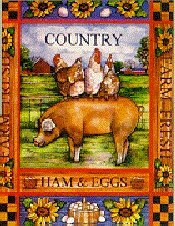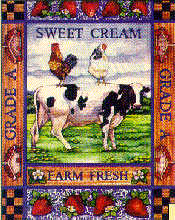| 1790 The first pioneers of Knox County settle along a river which the Indians called Owl Creek | |
| 1808 Knox County is founded |
| Life Without a Grocery Store? The farms of the first white settlers in Knox County were small, typically about one-hundred acres of land. The was usually enough land to support a farm with many different types of plants and livestock. This type of farm is called a general farm. Early farmers kept a few dairy cows for milk, chickens for eggs, and some hogs for meat. A large garden provided vegetables for the family. All grain crops were grown to feed the livestock or the family. Grain that was not used to feed the livestock was taken to a grain elevator where it would be ground into flour for use in the home or else sold for a small profit. Farmers only relied on off farm sources for a few items which they could not make themselves. Money from leftover vegetables out the family's garden and money from special farm products like maple syrup, enabled the farmer to buy these things from the town store. |   |
| Write down what your family buys at the grocery store. Next make a list of what an early farmer would have bought from the town store. What are the differences between the lists? How much of your food do you grow and raise at home? |
Reality: Many of the early farmers did not own their own homes. Often large landholders owned a lot of land, and the farmers were tenants. For many farmers this was a way to earn enough money to purchase their own land. Usually if farmers worked hard, they could buy their land within five years.
![]() Life Lesson: Livestock was the main cash crop of Knox County. A cash crop is what a farmer raises and then sells to make money. Grain was not grown as a cash crop. Now grain is a cash crop and is used to make many different types of food which leave the farm.
Life Lesson: Livestock was the main cash crop of Knox County. A cash crop is what a farmer raises and then sells to make money. Grain was not grown as a cash crop. Now grain is a cash crop and is used to make many different types of food which leave the farm.
Who worked on the farm?
Farm work was done primarily by family members. Men, women, and children of all ages helped on the farm and around the house. Children helped with many different jobs, from milking cows to planting crops. These chores are very similar to the chores that children who live on a farm do today! Long days of agricultural work could often be lonely, yet neighbors would visit frequently because farm families relied upon one another to help with harvesting and other group tasks.
| Make a list of chores that you think farm children would have done in the 1800's. Next write down the chores that you have. How are they different? Is there a different work ethic? |
What did farmers do for fun?
 | Farmers gathered in each other's kitches, while grange meetings and the church offered more opportunities to be with other people from the community. Henry Howe describes the close community of Knox County:
|
![]() Life Lesson:The farms and the farm community in Knox County, as well as elsewhere in the nation, remained like this until the 1900's, when changes in technology created enormous social and agricultural change. The Amish are in many ways the exception. Located mostly in the eastern part of Knox County, the Amish continue to have a close communities of general farms, much like the farms of early farmers in Knox County.
Life Lesson:The farms and the farm community in Knox County, as well as elsewhere in the nation, remained like this until the 1900's, when changes in technology created enormous social and agricultural change. The Amish are in many ways the exception. Located mostly in the eastern part of Knox County, the Amish continue to have a close communities of general farms, much like the farms of early farmers in Knox County.
| Write a letter to a farm kid who was your age in the early 1800's. Tell this person what your life is like! Write about what chores you have and what you do for fun. Compare your life to the lifestyle of farmers in the 1800's. |
 | Take me back in time! |

